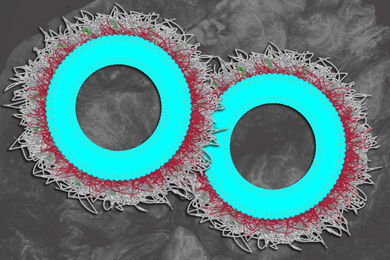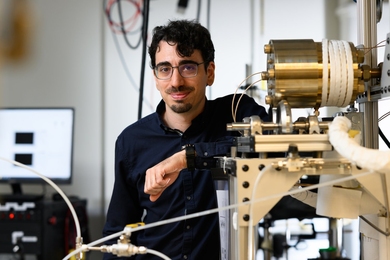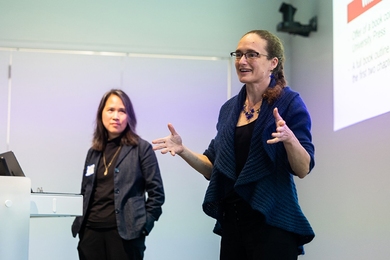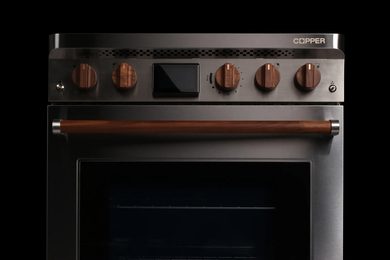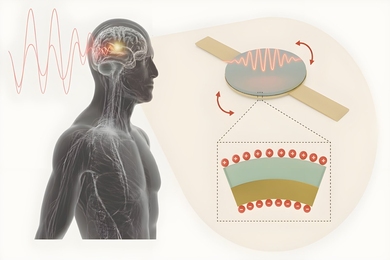With the School of Engineering's new Undergraduate Practice Opportunities Program , MIT sophomores can now gain experiences beyond classrooms and laboratories to prepare for their careers.
In its pilot year, the program launched a five-day intensive seminar for engineering sophomores during the last week of IAP, the first of three phases. Students will participate in summer internships in the second phase of the program. During the third phase in the fall, they will review their required reflective journals written in the summer, write final papers and give oral presentations on their Undergraduate Practice Opportunities Program (UPOP) experiences.
Off to a running start with almost 80 participants, UPOP delivered a message on its very first day: this is the real world, no tardiness will be tolerated, participation is mandatory and teamwork is even more strongly encouraged than in other MIT courses. The hands-on, case-study-based class has a teaching team from the Sloan School of Management and several engineering departments. Industry professionals (including some MIT alumni) serve as teaching assistants, each leading one of the 10 student teams.
"One of the challenges for us is to marry the best of in-depth technical education with a broadening experience for our students so that they truly gain an understanding of engineering practice," said Dean of Engineering Thomas L. Magnanti. "UPOP is a key component in achieving this objective."
"UPOP is making a strong statement about what engineering education should be," said Dick K. P. Yue, associate dean of engineering and professor of hydrodynamics and ocean engineering.
Data collected from alumni, students and employers of MIT graduates got the course started, Yue explained. "It was unequivocally clear that we needed to do more in terms of preparing our graduates for the workplace" in the areas of workforce skills, opportunities for internships and interaction with practitioners, he said.
The UPOP seminar taught effective oral presentation delivery skills, understanding the system dynamics of an organization, how to make profitable products, deriving customer requirements for a product, leadership skills, and developing arguments to make a recommendation on a project based on limited data.
Christopher Resto (S.B. 1999 in environmental engineering science), director of UPOP, sees the need for the program from both a student's and employer's viewpoint, being an alumnus and also having worked at Cap Gemini Ernst and Young as a manager of recent MIT graduates.
"I wish I had had something like this program when I was a student," he said. "In my former management capacity, I also saw a clear need for programs like this to make our students more multidimensional and holistic in their approaches to their work."
UPOP internships differ significantly from traditional engineering apprenticeships. In years past, a student had to commit to a long-standing relationship with a chosen industry or government position, and the organization had to pay a fee to recruit MIT interns. Now being phased out, the Engineering Internship Program, which provided internship opportunities in some of the School of Engineering departments, never drew a large percentage of students, something that UPOP hopes to change.
"We're exercising strong quality controls on these job opportunities. We're ensuring that our educational objectives are being emphasized in each student internship," Resto said.
Companies that have already offered to provide internships include Westinghouse, Morgan Stanley, Lehman Brothers and Schlumberger. Other participating organizations include Los Alamos National Laboratory, Draper Laboratory and the Georgia Tech Research Institute.
Financial support for UPOP also is forthcoming. The recent $20 million gift from Sycamore Networks and Cascade Communications co-founder Gururaj "Desh" Deshpande and his wife Jaishree to launch the new Deshpande Center for Technological Innovation (see MIT Tech Talk, Jan. 9) gives UPOP $500,000 a year for an initial five years. The Lord Foundation has granted $150,000, and the Kauffman Foundation has given $80,000 to pay salaries of UPOP students who choose placements with newer companies that could not otherwise afford to sponsor summer positions.
"Industry is hopeful and looks forward to MIT playing an even more significant role in their welfare, and we are working with them to make our graduates more useful," Yue added.
Both Magnanti and Yue expressed hopes that UPOP will become as well established at MIT as the highly successful Undergraduate Research Opportunities Program (UROP).
UPOP faculty member Christopher Magee said the week-long course gave students a valuable framework for their internships. "It will enable them to make a much more accelerated, effective use of their internships so that they will become truly great practicing engineers," he said. "It's possible to learn some of these skills throughout your career while on the job, but people who go through a process like UPOP to get this 'engineering science toolkit' of methods, tools and ways of thinking will likely be superior performers in their early careers." Magee is executive director of the Ford/MIT Strategic Technical Partnership and a professor of the practice of engineering systems in the Engineering Systems Division.
Jose Ramirez, a mechanical engineering sophomore who transferred from the Air Force Academy to MIT, was sold on UPOP from the start. "MIT gives me so many opportunities to grow as an engineer and also as a person. I've always been seeking opportunities like UPOP because engineers are not normally the people who get to understand the interaction and logic behind decision-making. This course is showing me that just dealing with people and evaluating the world around you are as much a part of engineering as physics is," he said.
Rosa Obregon, a UPOP sophomore in aeronautics and astronautics, is looking forward to getting experience and responsibility at her UPOP job site. "This course is really opening up the way I view the corporate world. Yes, you're an intern, but you do have to make decisions, work with people and think on your feet," she said. "And though we might not see the application of all of the course work at the moment, I know we eventually will once we're in the real world."
For more information about UPOP, call Resto at (617) 452-5099 or see the UPOP web site.
A version of this article appeared in MIT Tech Talk on February 6, 2002.

